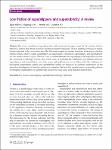Item Infomation
Full metadata record
| DC Field | Value | Language |
|---|---|---|
| dc.contributor.author | Zijian, Zheng | - |
| dc.contributor.author | Zhiguang, Guo | - |
| dc.contributor.author | Weimin, Liu | - |
| dc.date.accessioned | 2023-04-14T04:00:55Z | - |
| dc.date.available | 2023-04-14T04:00:55Z | - |
| dc.date.issued | 2022 | - |
| dc.identifier.uri | https://link.springer.com/article/10.1007/s40544-022-0659-9 | - |
| dc.identifier.uri | https://dlib.phenikaa-uni.edu.vn/handle/PNK/7934 | - |
| dc.description | CC BY | vi |
| dc.description.abstract | The issues regarding energy dissipation and component damage caused by the interface friction between a friction pair attract enormous attention to friction reduction. The key-enabling technique to realize friction reduction is the use of lubricants. The lubricants smooth the contact interfaces, achieving an ultralow friction contact, which is called superslippery or superlubricity. At present, superslippery and superlubricity are two isolated research topics. There is a lack of unified definition on superslippery and superlubricity from the viewpoint of tribology. Herein, this review aims at exploring the differences and relations between superslippery and superlubricity from their origin and application scenarios. Meanwhile, the challenges for developing superslippery surface and superlubricity surface are discussed. In addition, perspectives on the interactive development of these two surfaces are presented. We hope that our discussion can provide guidance for designing superslippery or superlubricity surfaces by using varies drag-reduction technologies. | vi |
| dc.language.iso | en | vi |
| dc.publisher | Springer | vi |
| dc.subject | superslippery and superlubricity | vi |
| dc.subject | friction reduction | vi |
| dc.title | Low friction of superslippery and superlubricity: A review | vi |
| dc.type | Book | vi |
| Appears in Collections | ||
| OER - Kỹ thuật điện; Điện tử - Viễn thông | ||
Files in This Item:

